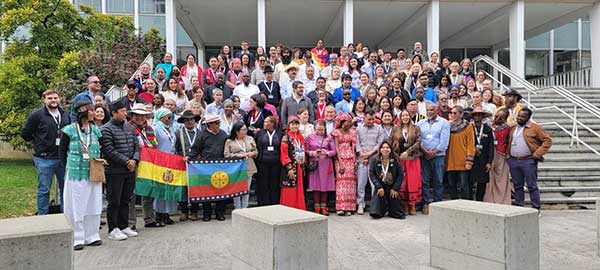
GENEVA – Nearly 100 Indigenous leaders from seven socio-cultural regions around the world have reached a historic consensus on what constitutes a “just transition” in the global shift toward green energy.
The agreement, documented in the Indigenous Peoples Principles and Protocols for Just Transition, outlines how projects involving renewable energy and sustainable development must respect Indigenous rights and territories to be considered just.
“For Indigenous Peoples, a just transition means exercising our own forms of territorial governance according to our traditions and ways of life,” the principles state.
The document emerged from the JUST TRANSITION: Indigenous Peoples’ Perspectives, Knowledge, and Lived Experiences Summit, held from October 8-10 in Geneva, Switzerland. It details 11 guiding principles that companies, governments, and organizations must follow to avoid perpetuating harm against Indigenous communities in the name of “green” initiatives.
“Activities that are being proposed or carried out on our lands, ice, waters, and territories in the name of a just transition, green economy, or emissions reduction, without the obtainment of our free, prior and informed consent or which threaten our sacred places, cultural practices, food sources, and ecosystems, or otherwise violate our inherent rights, are not a just transition,” the document asserts.
Rodion Sulyandziga, who chaired the Summit’s coordinating committee, underscored the significance of the agreement.
“Two years ago, we began convening Indigenous leaders to address the violence and harm that the so-called ‘green’ energy transition is perpetuating on our lands,” he said. “These are the first steps for anyone—be it corporate, state, or Indigenous-led enterprise—to build a truly just, sustainable, and inclusive economy for all,” Sulyandziga said.
The 11 principles include the right to life, self-determination, and sovereignty of Indigenous Peoples, as well as reparations for historical and continuing injustices.
These principles also reject colonial exploitation and call for full accountability and transparency in all projects affecting Indigenous lands.
Key among the demands is the “Land Back” movement, which advocates for the restoration of ancestral lands and unrestricted access to territories and resources that were taken without consent.
The principles also stress the importance of Indigenous ways of life, including food sovereignty, Indigenous science, and cultural practices that have protected ecosystems for generations.
“For too long, Indigenous voices have been marginalized. From the Amazon to the Arctic, the protection of our environment has always been intertwined with the protection of our people. We are the stewards of the world’s most vital ecosystems… There can be no climate justice without Indigenous justice,” Sulyandziga said.
The principles call for international bodies and human rights mechanisms to hold states accountable for violations, including forced evictions and displacement due to green energy projects.
Leaders also demand full accountability for any environmental damage caused by mining activities, which often devastate Indigenous lands and disrupt cultural practices.
Indigenous leaders have committed to defending these principles through advocacy and education, and to challenge any regulations, laws, or actions that ignore their right to Free, Prior, and Informed Consent.
They also vowed to stand in solidarity against the imposition of green energy projects that threaten their territories.
In a powerful conclusion, Sulyandziga said, “The world must understand that there can be no green transition without the full participation of Indigenous peoples. Protecting the Earth means protecting the people who have always protected it.”




















